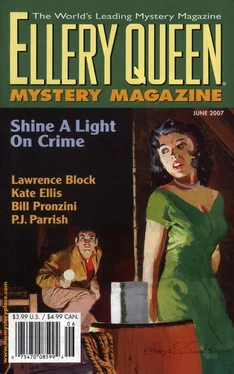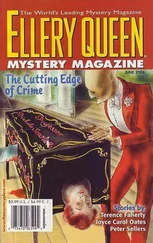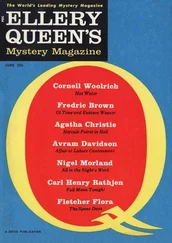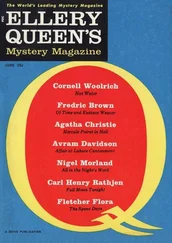Lawrence Block - Ellery Queen’s Mystery Magazine. Vol. 129, No. 6. Whole No. 790, June 2007
Здесь есть возможность читать онлайн «Lawrence Block - Ellery Queen’s Mystery Magazine. Vol. 129, No. 6. Whole No. 790, June 2007» весь текст электронной книги совершенно бесплатно (целиком полную версию без сокращений). В некоторых случаях можно слушать аудио, скачать через торрент в формате fb2 и присутствует краткое содержание. Город: New York, Год выпуска: 2007, ISBN: 2007, Издательство: Dell Magazines, Жанр: Детектив, на английском языке. Описание произведения, (предисловие) а так же отзывы посетителей доступны на портале библиотеки ЛибКат.
- Название:Ellery Queen’s Mystery Magazine. Vol. 129, No. 6. Whole No. 790, June 2007
- Автор:
- Издательство:Dell Magazines
- Жанр:
- Год:2007
- Город:New York
- ISBN:ISSN 0013-6328
- Рейтинг книги:5 / 5. Голосов: 1
-
Избранное:Добавить в избранное
- Отзывы:
-
Ваша оценка:
- 100
- 1
- 2
- 3
- 4
- 5
Ellery Queen’s Mystery Magazine. Vol. 129, No. 6. Whole No. 790, June 2007: краткое содержание, описание и аннотация
Предлагаем к чтению аннотацию, описание, краткое содержание или предисловие (зависит от того, что написал сам автор книги «Ellery Queen’s Mystery Magazine. Vol. 129, No. 6. Whole No. 790, June 2007»). Если вы не нашли необходимую информацию о книге — напишите в комментариях, мы постараемся отыскать её.
Ellery Queen’s Mystery Magazine. Vol. 129, No. 6. Whole No. 790, June 2007 — читать онлайн бесплатно полную книгу (весь текст) целиком
Ниже представлен текст книги, разбитый по страницам. Система сохранения места последней прочитанной страницы, позволяет с удобством читать онлайн бесплатно книгу «Ellery Queen’s Mystery Magazine. Vol. 129, No. 6. Whole No. 790, June 2007», без необходимости каждый раз заново искать на чём Вы остановились. Поставьте закладку, и сможете в любой момент перейти на страницу, на которой закончили чтение.
Интервал:
Закладка:
by Art Taylor
A writer who was first published in our Department of First Stories, Art Taylor has gone on to sell fiction to the North Carolina Literary Review, and the North American Review (where he was a finalist for the Kurt Vonnegut Fiction Prize). He’s an assistant professor of English at George Mason University and an occasional reviewer for the Washington Post.
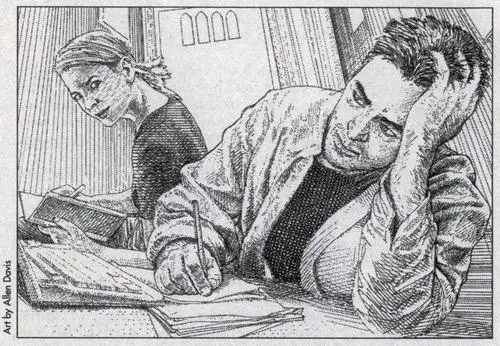
And Anna Sergeyevna began coming to see Gurov in Moscow. Once in two or three months she left S—, telling her husband that she was going to consult a doctor about an internal complaint — and her husband believed her, and didn’t believe her. In Moscow she stayed at the Slaviansky Bazaar hotel, and at once sent a man in a red cap to Gurov. Gurov went to see her, and no one in Moscow knew of it.
— Anton Chekhov, “The Lady With the Dog”
Philip turned tired eyes once more to his notebook: passages from Chekhov’s story copied verbatim in his own handwriting, notes penned in red ink all around the margins. What had begun as an exercise (hone craft by analyzing the master, reading is writing) had gradually sparked a passion in him, something he hadn’t quite felt with the stories he’d tried to write before, had never felt in front of a classroom of dull gazes. In only one sentence Chekhov hints at husband’s point of view, Philip had written early on, “believed her, didn’t believe her,” and then the words that had set the whole process in motion: A story of its own there? Throughout, the red ink threatened to overwhelm the black, staining his skin when the pen had bled on his fingers.
An entire page of clues and conjectures about the husband: Surname p. 574 is Von Diderits... First name not given: perhaps Aloysha, Evgeniy (nickname Zhenya), Gavril, Piotr... Crown Department or Provincial Government? Anna does not know. Check Britannica for background... How large is their house? How many servants? Elsewhere he’d jotted, Anna’s “internal complaint” intended as double entendre? And on another page, a chronology of the story’s scenes: Yalta where Anna and Gurov meet; the city of S — where The Geisha premieres; Moscow where the affair continues...
As he stared at the words and figures, Philip’s mind raced to pull the pieces, the possibilities, together. He could write this. This was the one, he knew it.
“So, how are things with the Russians?”
Catherine’s voice, behind him. How long had she been in the room? Philip detected a floral scent and hints of fruit — pears, perhaps? Grapes? She couldn’t have been standing there long, or he would have noticed it — unlike his wife to wear perfume. She usually smelled of finger paints and crayons, carried home from the art classes she taught at Ligon. He hooked his pen through the top of the clipboard, closed his eyes, and inhaled slowly. Grapes, definitely.
“It’s so dark in here,” she said, and he felt her hands on his shoulders. “But I’ll bet you haven’t even noticed.”
“I hadn’t really.” He opened his eyes again. Except for the glow of the computer screen — Britannica.com — the only light came from the mica-shade lamp on the desk, shining down on the open copy of Chekhov. Through the window, he saw that the sun had gone down and the night was pitch black, and he was reminded of Chekhov’s counsel: Don’t tell me the moon is shining; show me the glint of light on the broken glass. The window sill was steeped in shadows from the streetlight. A blur of buds bloomed on the bush beyond. Still, no moon. The CD had run out as well — how long before, he didn’t know. Monk, he’d been listening to. “In Walked Bud,” “ ’Round Midnight,” “Evidence.”
“But the Russians are good.” He leaned his head forward as she kneaded his shoulders. “Or at least the one I’m working with. It’ll be a good story when I’m done, I just feel it. But I’m really still just making notes. Looking for the key into the whole thing.”
“But you’ve been in here for hours.”
“Oh, it couldn’t have been that long,” he said. “After all, what time did we have dinner?”
She laughed. “I ate some leftover pizza about a half-hour ago,” she said. “But unless you have a stash of food in here...” And she was right. He couldn’t remember having eaten.
“Oh, well,” he shrugged. She stopped touching him.
“Well, try to eat something. I’m going out for a while.”
“Anyplace special?” he asked, turning in his chair to see her. She wore a bandana print skirt, sleeveless denim top. Black hair pulled back in a ponytail. Scant light came from elsewhere in the house through the open doorway behind her, falling lightly on the edge of the bookcase, a pile of mail, the guest bed that shared this room. Catherine herself was caught half-in, half-out of the mica-tinted glow, and he tried to think what word she might be: not luminous, not scintillant ... evanescent?
“I don’t know,” she said. “Target, maybe? We don’t really need anything, but I’m just feeling a little restless tonight. Just want to get out.” The top edge of her face was shadowed (he knew this word: chiaroscuro; she had been captured in chiaroscuro ), but from the turn of her chin, he imagined that her brow must have furrowed. “I may stop by Borders afterwards, flip through some magazines, get a cup of coffee. Maybe pick up a new book for the kids at school. They stay open pretty late, right?”
He nodded. “New perfume?”
“It’s French,” she said. “Annick Goutal. It’s called ‘Ce Soir Ou Jamais.’ The woman at Belk’s described it as Turkish rose gardens, wildflowers, and black currants. You like?”
Black currants. He hadn’t been far off with grapes.
“I feel... enthralled,” he said, grinning. “Fragrance is a seductive thing.”
She leaned over to kiss his forehead. “I left a couple of pieces of that pizza for you in the microwave,” she whispered. “Don’t forget them.” And then she was gone.
Her scent lingered in the air as he picked up his pen, and for a moment he was unable to remember where he had been in his notes. Then, turning a new thought over in his mind, turning the key he had found, he once more began to write: Fragrance is a significant thing.
Evgeniy von Diderits enjoyed his breakfasts with enthusiasm. He savored the smell of frying dough almost as much as the vareniki themselves, plump with eggs and cheese or tucked tight with minced mutton — the latter his own twist on tradition. He liked dipping his curly sausages in black currant jam, and after he finished his meal, he liked to swirl a dollop of that same jam into his tea as well. As the cup cooled, he stroked his small side-whiskers or caressed the tips of his nostril hair, reading yesterday’s edition of the Kiev Telegraph and thinking eagerly about the meetings scheduled for the day ahead. In the shadow of a good breakfast, with his wife seated just across the table and the servants bustling through their morning duties, Evgeniy believed briefly, firmly, that little could disturb the world he had created for himself and his wife — indeed, for the entire village of S—.
“I am going to Moscow today,” said Anna Sergeyevna. “I think I told you. For a few days. I will be taking the morning train at eleven.”
Von Diderits looked up from his paper. His wife stared dully out the window, her fair hair pinned against her head, her breakfast plate nearly untouched. He did not speak, waiting for her to turn her gray eyes back his way.
Читать дальшеИнтервал:
Закладка:
Похожие книги на «Ellery Queen’s Mystery Magazine. Vol. 129, No. 6. Whole No. 790, June 2007»
Представляем Вашему вниманию похожие книги на «Ellery Queen’s Mystery Magazine. Vol. 129, No. 6. Whole No. 790, June 2007» списком для выбора. Мы отобрали схожую по названию и смыслу литературу в надежде предоставить читателям больше вариантов отыскать новые, интересные, ещё непрочитанные произведения.
Обсуждение, отзывы о книге «Ellery Queen’s Mystery Magazine. Vol. 129, No. 6. Whole No. 790, June 2007» и просто собственные мнения читателей. Оставьте ваши комментарии, напишите, что Вы думаете о произведении, его смысле или главных героях. Укажите что конкретно понравилось, а что нет, и почему Вы так считаете.
